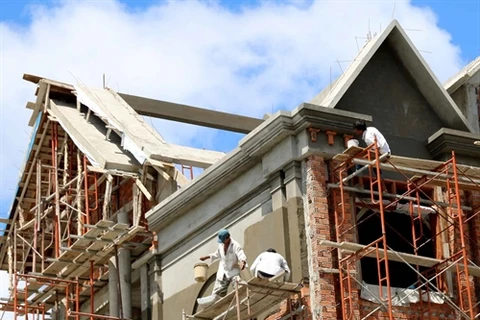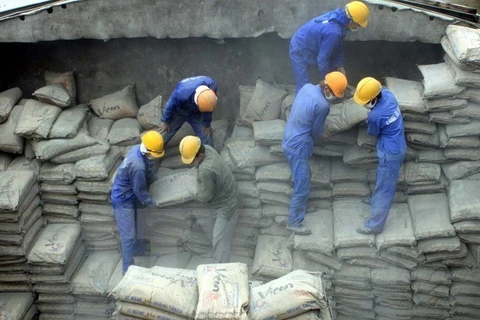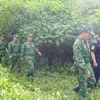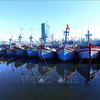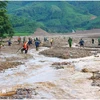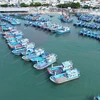 Fishermen take the tuna they caught out of their vessel when they dock in the south central province of Khanh Hoa. (Photo: VNA)
Fishermen take the tuna they caught out of their vessel when they dock in the south central province of Khanh Hoa. (Photo: VNA) Thanh Hoa (VNS/VNA) - Millions of fishermen are exposed to the risk of accidents because of an unsafe work environment.
On March 16, Nguyen Van Sy in the central province of Thanh Hoa and two other fishermen were pulling up a 2.5-tonne fish net. The weight of the net and the fast moving water pulled down a winch cable, which tightened around Sy’s ankles, cutting off his left foot and half of his right foot.
Significant Government budgets are spent on ensuring work safety, but in sectors that do not have work safety officials and rarely have access to labour health services, like agriculture and fishery, workers are constantly facing death traps while trying to make ends meet.
Nguyen Thanh Sang, a 60-year-old fisherman from Thanh Hoa province’s Hoang Thanh commune, often starts his day at 3am. Like other locals, Sang and his son fish off their communal beach on a simple raft. “We hardly ever wear life jackets, and don’t think much about work safety,” Sang said.
“There was a time when we were pulling the net and a storm came, pulling us into the sea,” he added. “We held onto the raft, climbed on it and returned home.”
The fear of having nothing to eat is bigger than that of losing his life, so he held onto his work despite the attendant risks.
Some 255 households in the commune make their living by fishing, according to Le Huu Tu, Vice Chairman of the Hoang Thanh People’s Committee. “Most of them fish inshore on a small scale, so they don’t care much about safety for their assets (boats, rafts) and labourers,” he said.
The commune itself isn’t equipped with expertise and financial ability to provide training on labour safety at sea, he added. Some organisations came to the commune in recent years to provide fishermen with fishery knowledge and raise awareness of work safety, but not on a regular basis, he said.
Authorities visited each household in an attempt to persuade the fishermen to buy insurance for their boats and labourers, but the only result was to remind fishermen to be more vigilant about safety, he added.
Labour safety at sea is a complicated issue, not only due to an often harsh work environment, but also unforeseeable factors such as extreme weather that could cause fatal accidents. But most fishermen haven’t been trained to deal with these hazardous conditions, said Nguyen Anh Tho, deputy director of the Department of Work Safety under the Ministry of Labour, Invalids and Social Affairs (MOLISA).
Some vessel owners are ignorant of safety risks, and do not carry equipment such as life jackets and lifeboats; some do prepare but with outdated equipment, according to Tho. “A specific strategy is obviously much needed in order to amplify the importance of work safety in this sector,” he said.
Fishermen mostly contribute capital to purchase vessels, sail and work together without contracts, so it’s difficult for the authorities to protect them if they don’t protect themselves with work safety equipment, according to Nguyen Viet Thang, Chairman of the Vietnam Fisheries Association.
Authorities are often unaware of accidents, which are settled by money among fishermen.
Acknowledging that not enough attention has been paid to ensuring work safety for fishermen, farmers and freelance labour, Nguyen Tien Dung, MOLISA’s chief inspector, has proposed to the ministry to conduct more inspections of this informal labour market (one without labour relations) from 2018.
The inspectorate has also proposed that specialists in the agricultural, fishery and informal labour sectors from MOLISA’s Department of Work Safety be authorised to conduct inspections in these sectors.
Thơ said amendments to the Law on Labour Safety enabled the informal labour sectors to receive support from the Government and localities since July 2016. Some, like Thai Binh and Thanh Hoa provinces, saved parts of their budgets to support job training and awareness-raising activities for informal labourers.
A national programme on labour safety and hygiene in 2016-2017 also opened work safety training classes in these sectors, he said.-VNA
VNA
